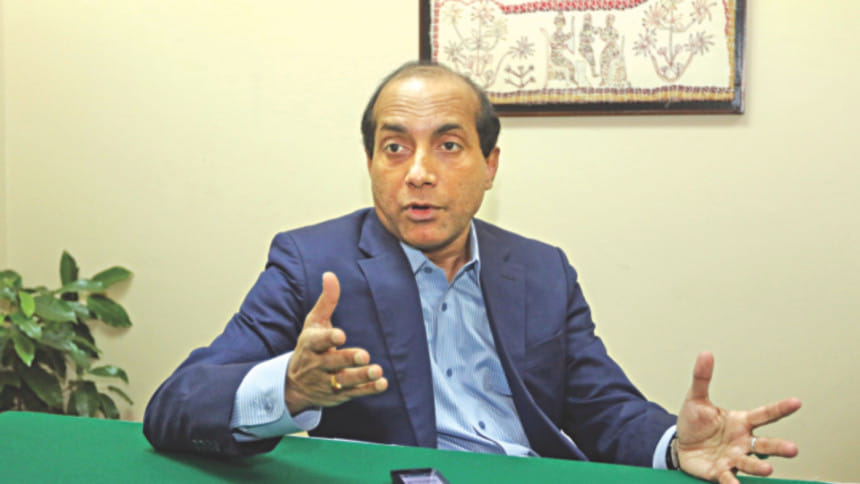A trailblazer in cancer treatment

Brain drain remains a global problem, especially for many developing countries including Bangladesh. Lured by better pay and benifits abroad, the brightest professionals take off to seek their fortune.
Only a few returns home at some stage in their career.
Bimalangshu Ranjan Dey is one of them, and thankfully enough, he returned at a time when the country badly needed his knowledge.
A bone marrow transplant physician at the Massachusetts General Hospital (MGH) in the US, Bimalangshu helped set up the country's first ever bone marrow transplantation (BMT) plant at Dhaka Medical College Hospital in 2012.
The initiative, a joint venture by the health ministry and the MGH, has already performed bone marrow transplants for 12 patients, saving all the lives. The treatment at the DMCH was on a par with international standards, but at a much lower cost.
A bone marrow transplant replaces a patient's unhealthy blood forming cells with healthy ones.
Now a US expatriate, Bimalangshu had a modest beginning to his life. Born to a lower middle-class family in Sylhet, he grew on the Chhatak Cement Factory compound where his father used to work.
A bright student of Chhatak Cement Factory High School, he stood second on the scholastic achievement list in SSC in 1975. Two years later, he took the HSC exams from MC College in Sylhet and secured the same position on the academic achievement list.
He studied physics at Dhaka University for his love of physics and mathematics.
There came a turn in his life. In 1978, he went to Budapest under a scholarship to study medicine at Semmelweis Medical School, the oldest medical school in Hungary.
After graduating with a distinction from the college, he received a Gold Medal from the education ministry of Hungary. He then moved to the US and joined the hematology-oncology programme at Massachusetts General Hospital in 1993. After doing a PhD in transplantation immunology, he joined the hospital's BMT unit.
In 2005-06, he came back to Bangladesh to assess how his knowledge in cancer medicine could help his home country.
In 2010, he got involved with the Bangladesh-based AK Khan Healthcare Trust and helped it design a nurse training course and a cervical cancer screening programme for poor women.
Under the programme, his colleague from the US hospital, surgical oncologist AK Goodman set up a clinic in Korail slum in the capital and screened hundreds of women for cervical cancer.
It was around that time when Bimalangshu started visiting the health ministry to seek help from the government to scale up the operation of the clinic.
He met the then health minister AFM Ruhal Haque, who wanted to know why the physician was not using his knowledge and expertise in Bangladesh.
Bimalangshu replied, "I would be ready to help the local initiative on one condition: The centre can't be a piecemeal project. Rather, it has to be a centre of excellence and we shall do it right and safe."
Ruhal readily agreed and kept his door open to Bimalangshu.
The physician arranged a partnership agreement between the MGH and the health ministry. And the rest is history.
He ensured that the BMT centre at DMCH operates in line with international standards so that nobody needs to go abroad for the treatment anymore.
Bimalangshu's father Sukumar Chandra Dey, who died in 1993, has been a role model for him. His mother Monorama Dey was rather a simple but wise and insightful woman.
A father of two, Bimalangshu is fond of music, Rabindra Sangeet in particular. His wife Chandra Dey, also from Bangladesh, is a Rabindra Sangeet exponent.
Their son Shomitro is a college student and daughter Priyana a schoolgirl.
The physician now plans to focus on cancers in women and develop a programme to heal cancerous tumors that can't be treated by BMT.
His wife and children call him a workaholic. It is his workaholic tendencies that made him famous and helped him save numerous lives from the grips of blood cancer.
Dr Mohiuddin Khan, head of the BMT programme at DMCH, said: "Dr Bimalangshu is so serious that when we are out on our round in the morning in Bangladesh time, he is available on Skype despite it is nearly midnight in the US. He talks to patients, physicians and nurses on Skype."

 For all latest news, follow The Daily Star's Google News channel.
For all latest news, follow The Daily Star's Google News channel. 



Comments